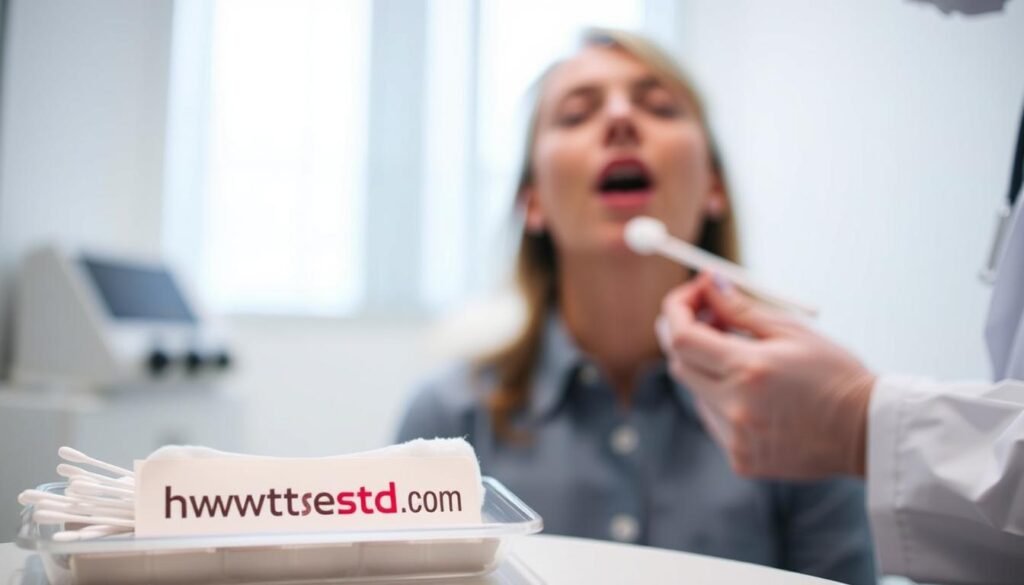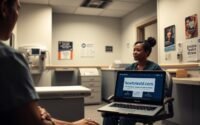Comprehensive Oral STD Testing for Your Well-Being
Sexually transmitted diseases are a big worry for public health. It’s very important to take care of your health. The Mayo Clinic says many people have STDs. The tests you need depend on your risk.
Knowing your oral health status is key. Some STDs show up in your mouth. Getting tested early helps treat them fast. This stops serious problems later.
Key Takeaways
- Comprehensive oral STD testing is essential for overall well-being.
- Risk factors influence the types of STD testing required.
- Early detection through testing can prevent long-term health issues.
- Being proactive about your health is very important in managing STDs.
- Oral health testing is a vital part of STD testing.
The Importance of Oral STD Testing
Knowing about oral STD testing is important for your health. It helps find and treat diseases in your mouth early.
Understanding Oral STD Transmission
Oral STDs spread in different ways. It’s important to know how they are passed on.
Common Transmission Methods
Oral STDs spread through touching infected areas or fluids during oral sex. Herpes Simplex Virus (HSV) and Human Papillomavirus (HPV) are common ones.
Activities That Increase Risk
Not using protection during oral sex and having many partners raise your risk. Knowing these risks helps you stay safe.
The CDC says some groups face higher STD risks. These include young people and those with many partners. They suggest regular tests for these groups.
| Risk Factor | Description | Recommendation |
|---|---|---|
| Unprotected Oral Sex | Direct contact with infected areas without protection | Use protection during oral sex |
| Multiple Sexual Partners | Increased exposure to possible infections | Regular STD testing |
| History of STDs | Having had an STD before makes you more vulnerable | Go for frequent check-ups and practice safe sex |
Being proactive about your health is key. Don’t delay getting tested. Oral STD tests can greatly lower the risk of serious infections.
Common STDs That Affect the Oral Cavity
Many STDs can show up in the mouth. This makes oral infection testing very important. The mouth can get sick from different sexually transmitted diseases. So, STD testing for oral infections is key for staying healthy.
Herpes Simplex Virus (HSV-1 and HSV-2)
Herpes Simplex Virus can cause mouth sores. Both HSV-1 and HSV-2 spread through kissing. So, STD testing is vital to find out.
Human Papillomavirus (HPV)
HPV can lead to mouth cancers. Some HPV types cause throat cancers. This shows why oral infection testing is so important.
Gonorrhea
Gonorrhea is a common STD that can hit the mouth. The CDC says it’s a top STD spread by kissing. This makes STD testing for oral infections very important.
Syphilis
Syphilis can also show up in the mouth. It can cause mouth sores or worse problems if not treated.
Chlamydia
Chlamydia can also affect the mouth. Even if you don’t feel sick, it can spread through kissing. So, regular STD testing is a must.
Knowing about these STDs and their effects on the mouth is key. Regular oral infection testing and being aware can stop these infections from spreading.
Recognizing Symptoms of Oral STDs
It’s important to know the signs of oral STDs to keep your mouth healthy. Oral STDs can show different symptoms. Some are easy to see, while others are not.
Visible Signs to Watch For
Visible symptoms are often the first signs of an oral STD. These can include:
Sores and Lesions
Sores and lesions in the mouth or on the lips can mean you have an STD like herpes or syphilis.
Changes in Tissue Color
Changes in the color of your mouth tissues can mean an infection. This could be oral thrush or leukoplakia, linked to HPV.
Non-Visible Symptoms
Not all symptoms of oral STDs are easy to see. Some are very subtle or hidden inside.
Pain and Discomfort
Pain or discomfort while eating or even resting can be a sign of an oral STD. This could be gonorrhea or chlamydia.
Systemic Symptoms
Oral STDs can also cause symptoms like fever or swollen lymph nodes. This shows the infection is affecting your whole body.
When Symptoms May Not Be Present
Many STDs don’t show symptoms at all. This is why regular oral STD screening is key for catching and treating them early.
| Symptom | Possible STD |
|---|---|
| Sores/Lesions | HSV, Syphilis |
| Changes in Tissue Color | HPV (Leukoplakia), Oral Thrush |
| Pain/Discomfort | Gonorrhea, Chlamydia |
| Systemic Symptoms | Various STDs |
Even without symptoms, regular oral health testing is vital. It helps catch and treat oral STDs early.
STD Testing for Oral Infections: Methods and Procedures
Getting tested for STDs in the mouth needs a few steps. We use different tests to make sure we get the right results.
Oral Swab Tests
Oral swab tests are very common. They gently take cells from inside your mouth. This helps find out if you have an STD.
How the STD Oral Swab Test Works
This test is easy and done in a doctor’s office. The swab goes to a lab. There, it checks for STDs.
Accuracy Rates
These tests are very accurate. But, how well they work depends on the STD and the quality of the sample.
Blood Tests
Blood tests are also important. They check for STDs that oral swabs can’t find. A blood sample is taken and tested for STD markers.
Visual Examinations
A doctor will first look at your mouth. They look for signs like sores or rashes. This is the first step in finding out if you have an STD.
Culture Tests
Culture tests take a sample from the affected area. It’s then grown in a lab to find bacteria or viruses. This is good for finding gonorrhea or syphilis.
Key Testing Methods:
- Oral Swab Tests
- Blood Tests
- Visual Examinations
- Culture Tests
Each test is important for diagnosing and treating oral STDs. Knowing about these tests helps you take care of your health.
Where to Find Oral STD Testing Near Me
Oral STD testing is key to keeping your sexual health good. It’s important to know where to go. Many healthcare places offer testing, so you can find a spot that’s easy and safe.
Primary Care Providers
Your primary care doctor is a great first stop for health needs, like STD testing. They can do comprehensive testing services, including oral STD tests. They also help with treatment if you need it.
Sexual Health Clinics
Sexual health clinics, like those at Planned Parenthood, focus on STD testing and treatment. They offer private and cheap testing. This makes them a great choice for oral STD testing.
Community Health Centers
Community health centers are another place for oral STD testing. They often have low-cost or free testing services. They help many people in the community.
University Health Services
Students can use university health services for STD testing. These services are part of student health plans. They offer many testing options.
Online Resources for Finding Testing Locations
Looking for a quick way to find testing spots? Online resources can help. Websites and directories can show you STD testing clinics near you. This makes it easy to get tested.
How Often Should You Get Tested?
How often you should get tested for STDs depends on your risk and sexual history. Knowing these factors helps you figure out when to get tested for oral STDs.
Guidelines Based on Risk Factors
The CDC says sexually active people should get tested based on their risk and history. If you have many partners or have had STDs before, you should test more often.
Recommended Testing Schedules
The CDC recommends testing for STDs at least once a year if you’re sexually active. But, if you’re at higher risk, you might need to test every 3-6 months.

After Possible Exposure
If you think you might have been exposed to an STD, test as soon as you can. The timing of your test depends on the STD type and the test method.
Being Proactive About Regular Testing
Being proactive about your health means regular STD testing. By knowing your risk and following testing schedules, you can protect your health and make smart choices.
Confidential STD Testing: Understanding Your Privacy Rights
Keeping your STD test private is not just nice; it’s the law. When you get tested, you’re not only looking after your health. You’re also keeping your personal info safe.
HIPAA Protections
The Health Insurance Portability and Accountability Act (HIPAA) makes sure your medical records stay private. HIPAA protections mean your test results can’t be shared without your okay.
Anonymous Testing Options
If you want even more privacy, anonymous testing options are out there. Some places let you get tested without sharing your name.
Discussing Results with Partners
Talking about your STD test results with your partners is key. It’s a talk that needs thought and care.
Digital Privacy and Online Test Results
In our digital world, online test results are getting more common. Keeping your digital privacy is key to keeping your health info safe.
Knowing your privacy rights when you get tested is important. It helps you feel safe and healthy. By understanding your rights, you can test with confidence.
Cost and Insurance Coverage for Oral STD Screening
Understanding the costs of oral STD screening is key for good health. It’s important to know how much it costs and what insurance covers. This helps people make smart choices about their health.
Insurance Coverage Under the Affordable Care Act
The Affordable Care Act (ACA) makes sure some tests are free. This includes STD screening. Check your insurance plan to see what’s covered for free.
Free and Low-Cost Testing Options
If you can’t afford it, there are cheaper options. Places like community health centers and sexual health clinics offer low-cost tests. These places are great for those who need affordable and private care.
Using Health Savings Accounts (HSAs) and Flexible Spending Accounts (FSAs)
If you have an HSA or FSA, you can use it for tests. This can save you money on taxes. Always check with your account manager to see what’s allowed.
Comparing Costs Between Testing Facilities
Prices for STD tests vary a lot. Looking at different places can help you find the best deal. Some places might offer discounts for more than one test.

- Verify insurance coverage before testing
- Explore free and low-cost testing options
- Utilize HSAs or FSAs for testing expenses
- Compare costs between different testing facilities
At-Home Oral STD Testing Options
At-home oral STD testing is getting more popular. It’s easy and private. You can test for STDs without going to a doctor.
How Home Testing Kits Work
Home testing kits are easy to use. They let you collect your own samples. The process has two main steps.
Collection Methods
Each kit comes with instructions and materials. For example, an STD oral swab test might ask you to swab your cheek or tonsils.
Shipping and Lab Processing
After you collect your sample, you send it to a lab. They analyze it. Then, you get your results online, safely.
Reliability of Home Tests
The accuracy of home STD tests depends on the test and lab. Pick a kit from a trusted provider for best results.
When to Choose Home Testing vs. Clinical Testing
Home testing is great for those who want privacy or can’t get to a doctor. But, if you need advice or have complex health issues, see a doctor.
Popular Home Testing Brands and Services
Many brands offer at-home STD testing. Here’s a look at some:
| Brand | Test Type | Cost | Result Time |
|---|---|---|---|
| Everlywell | STD Panel | $99-$149 | 3-5 days |
| STDCheck | STD Panel | $49-$99 | 2-5 days |
| myLAB Box | STD Panel | $99-$299 | 2-5 days |
When picking a service, think about cost, test types, and how long it takes to get results.
What to Expect After Your Oral Infection Testing
Oral infection testing is just the first step. Understanding your results and what to do next is key. After your test, you’ll get your results. These will tell you what to do next.
Understanding Your Results
Getting your test results can be scary. It’s important to know what they mean.
Positive Results: Next Steps
If your results are positive, you have an STD. Don’t panic. Talk to your doctor about treatment. It’s also important to tell your sexual partners to stop the spread.
Negative Results: Ongoing Prevention
A negative result means you don’t have the STDs tested for. But, it doesn’t mean you can’t get one in the future. Keep practicing safe sex and get tested regularly.
Treatment Options if Positive
Treatment depends on the STD. For bacterial infections like gonorrhea and chlamydia, you’ll get antibiotics. For viral infections like herpes, antiviral meds can help.
| STD | Treatment | Follow-Up |
|---|---|---|
| Gonorrhea | Antibiotics | Re-test after treatment |
| Chlamydia | Antibiotics | Re-test after treatment |
| Herpes | Antiviral medications | Ongoing management |
Follow-Up Testing Recommendations
After treatment, you might need more tests. This is to make sure the infection is gone. How long you wait depends on the STD.
Emotional Support Resources
Getting an STD diagnosis can be tough. It’s good to talk to your doctor, a counselor, or join a support group. They can help a lot.
Conclusion: Taking Control of Your Oral Health
Regular STD testing is key for good health, more so for those who are active. Testing your mouth for STDs is also important. It helps find and treat diseases early.
Testing for oral infections is easy and works well. You can pick from oral swabs or blood tests. It’s important to be active about your health and not delay testing.
Knowing how to test for oral health and getting regular STD tests helps keep you safe. It also keeps your loved ones safe from oral STDs. Take care of your health today and make smart choices for your well-being.
FAQ
What is oral STD testing, and why is it important?
Oral STD testing finds diseases in the mouth. It’s key for catching diseases early. This helps avoid serious health problems later.
How are STDs transmitted orally?
STDs spread through mouth contact with infected fluids. This can happen during oral sex. Diseases like gonorrhea and herpes can spread this way.
What are the symptoms of oral STDs?
Signs of oral STDs vary. You might see sores or feel pain. Some people don’t show symptoms, so testing is very important.
What methods are used for oral STD testing?
Tests include swabs, blood tests, and visual checks. The right test depends on the disease and your risk.
Where can I find oral STD testing services near me?
You can find testing at health clinics and online. Look for services in your area.
How often should I get tested for STDs?
Testing frequency depends on your risk. If you’re active, test at least once a year. Test more often if you’re at higher risk.
Are STD test results confidential?
Yes, results are kept private. Many places offer anonymous tests. Always talk about your results with a doctor.
How much does oral STD testing cost, and is it covered by insurance?
Costs vary by test and location. Many insurances cover it. You can also find free or low-cost tests.
Can I do oral STD testing at home?
Yes, home kits are available. They’re reliable if used correctly. Home tests are good for those who prefer privacy.
What happens after I get tested for oral STDs?
You’ll get your results and any needed treatment. If positive, you’ll discuss treatment options. You can also get emotional support.
How can I take control of my oral health through STD testing?
Be proactive with testing and know your risks. Regular testing helps catch diseases early. This keeps you healthy in the long run.


